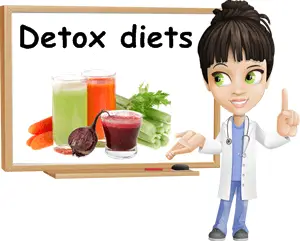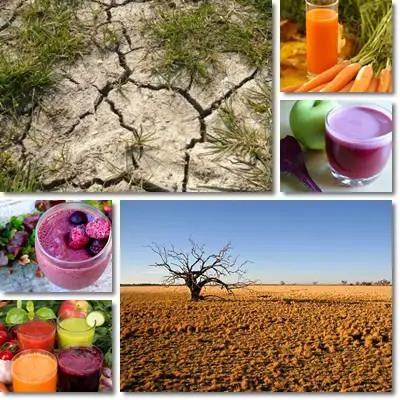Detoxification diets are the newest trend in health and wellness these days. While they may stem from sensible reasoning and follow the trodden path of healthy eating, they have their faults.
Most detox diets are restrictive: they restrict the number of foods and amount of food we eat and, consequently, our intake of essential nutrients, promoting or accentuating deficiencies. They are also short-term so they cannot produce any relevant, long-term health benefits.
Even more, many of these diets advance the idea that eating a single food or class of foods, be it ginger or leafy greens or high-protein foods for a set period of time will indiscriminately clear all of our health problems. But to restrict our diet to one or a few nutritionally superior foods without acknowledging that our body requires an entire range of nutrients is not healthy eating at all. It isn’t a diet that detoxifies our body, but organs specialized in this kind of thing, such as the liver and the kidneys.
So how much does a detox diet actually help?

Detoxification diets have been around since forever. The father of Western medicine, Hippocrates, recommended fasting as detoxification and medical treatment.
Fasting is still an important purification (or detoxification) practice in numerous religions. However, detoxification has since evolved and now centers on consuming one or several key-foods with a superior nutritional content, preferably raw and in juiced form.
Modern detox diets come with both advantages and disadvantages, but some of their shortcomings may be overcome.
The advantages Of Detoxification
No detox diet will ever suggest foods such as fast food products, baked sweets, cold meats, frozen foods and so on. Instead, any respectable detox diet will propose healthy food options we might not normally consider consuming, especially fresh fruits and vegetables such as ginger, leafy greens such as kale, Bok choy or celery, beets, spinach, raspberries or blueberries, etc.
Here are some of the most notable immediate health effects we might enjoy as a result of a well-thought detox diet:
1) Better digestion (at least for the duration of the detox period and maybe a little while after).
2) Colon cleanse and constipation relief (at least temporarily).
3) Bowel movement regularity.
4) A feeling of being lighter.
5) Better mood deriving from all the other benefits.
6) Weight loss (not necessarily significant or sustainable).

When on a detoxification diet, we do get a higher than normal intake of some vitamins and minerals, but not the entire range of essential nutrients we need on a daily basis, this being the reason why some people feel worse. And the sheer fact that we are not allowed to eat heartier food can contribute to a lower calorie intake and even help us lose a few pounds.
The benefits we might be experiencing when on a detox diet really depend on how our diet was beforehand.
A person who is already enjoying excellent dietary habits will most probably continue to feel great and energized when on a detox diet, even if restricted to a few foods. Instead, if we do not enjoy a balanced diet or already have some health issues, then a detox diet is not a sensible solution.
Having a sudden and significant increase in the amount of fresh fruits and vegetables we consume will help regulate intestinal transit time and solve related problems such as constipation. It can help us lose a bit of weight and feel lighter. Our mood may improve if the diet we are following centers around foods rich in magnesium. Although short, a sensible detox diet might set things in motion for us.
Nevertheless, major improvements such as stronger immunity, reduction of inflammation levels, energy boost, clearer thinking, stronger nails or more luscious hair take time and will not be the result of a 3-day or 7-day detox diet.
This is because real detoxification is about eating right and living right all the time. By doing this, we allow our body to work as it should and detoxify itself, because it isn’t food that actually detoxifies us, but our properly-functioning liver, kidneys and colon.
The disadvantages Of Detoxification
By its very nature, a detox diet comes with side effects, risks and disadvantages. Any immediate and significant health improvement is most likely a sort of placebo effect as our body needs time adjust and to take in dietary and lifestyle changes, then manifest improvements in our health status.
Here are several very real risks of a detox diet:
1) Low energy levels and fatigue proportional to the restrictiveness of the diet.
2) Low blood pressure if the detoxification meal plan does not include foods rich in magnesium and potassium or excludes sodium almost completely.
3) Nausea and fainting due to calorie restriction.
4) Flatulence, burping, bloating and other digestive disturbances most likely due to a sudden increase in dietary fiber intake.
5) Constant hunger sensation if calorie intake is too low.
6) Associated bad mood (caused by hunger, low blood sugar, low energy levels etc.).
7) Muscle aches and headache.
8) Lightheadedness and weakness.
9) Low blood sugar levels.
7 Aspects to consider On a Detox Diets
The most important 7 aspects to consider when entertaining the idea of a detoxification diet:
1) Antinutrients
Antinutrients are compounds in food that limit nutrient absorption. Oxalic acid and oxalates, for example, are found in generous amounts in spinach, chard or beets and reduce calcium absorption.
Phytic acid is found in grains and legumes such as lentils, chickpeas, soybeans, as well as peanuts, hazelnuts, almonds or Brazil nuts and reduces calcium, copper, iron, magnesium and zinc absorption. Glucosinolates from cruciferous vegetables (mustard, cabbage, broccoli, etc.) interfere with iodine absorption. Dietary fiber in large amounts also acts as an antinutrient, reducing dietary mineral absorption.
2) Pesticides
Pesticides are everywhere nowadays, even on organic foods. And considering that most detox diets recommend a wild intake of fresh fruits and vegetables, we must realize that we also get a significant intake of pesticides along with healthy elements.
For this reason it is not wise to eat large amounts of only a few selected foods for a longer period of time as we risk taking in a lot of a certain pesticide at once. Ironically, the skin, which is a particularly rich source of essential nutrients and antioxidants, is also full of pesticides.
Washing foods well and peeling their skin helps.
3) Bacteria and parasites
Fruits and vegetables are very likely to carry dangerous bacteria and even worms and intestinal parasites. Salad greens may be contaminated with E. coli and fruits may be carriers of Salmonella. Giardia duodenalis, Cyclospora cayetanensis, Cryptosporidium spp. and even tapeworms have been found on leafy greens, apples and other fruits and vegetables. Contamination occurs via fecal matter, either from humans or animals and pasteurization is the only safest method of eliminating the risk of contracting a bacterial or parasitic infection.
4) Soil depletion and less nutritious foods
Intensive agricultural practices have stripped the land of most of its nutrients. This means that the food we now grow forcefully on depleted soils is not as nutritious as it was 50 or 100 years ago.
So despite eating right, we are slowly getting less and less nutrients for the same amount of food. Agricultural practices differ from crop to crop and each farming choice affects nutrient density further, leaving us with no real and exact measurement for the nutritional value of the foods on our plate.
5) Pollution
While it may not seem to matter, both pollution and radiation affect food quality. Numerous crops are grown in the vicinity of big cities and thus take in a lot of dangerous toxins with highly negative health effects. Taking vitamin C can help reduce the health impact of toxins in general, as well as promote the elimination of heavy metals and inactivate allergens.
6) Contamination
Plants absorb contaminants of all kinds, some more than others. Bananas, potatoes and Brazil nuts absorb radiation naturally from the surrounding environment, but any plant will readily absorb contaminants such as heavy metals or toxins if planted near a source of pollution or in contaminated or polluted soil. So check the origin of your produce to see where your food comes from, especially if you plan on starting a detox diet and pursuing it for longer.
7) Restrictiveness
The main issue with detox diets is restrictiveness. Most diets are restricted to one or a few selected foods meant to detoxify our body. The choice for one food or another does not have any scientific basis as our liver, kidneys and colon are in charge of eliminating toxins. And they need vitamins and dietary minerals to work properly. If we limit our diet to one or four foods, then we will most likely be missing out on important nutrients.
Moreover, detox diets tend to concentrate on fruits and vegetables exclusively. But excluding healthy fats from nuts, seeds, dairy products or eggs and quality protein from animal sources such as chicken eggs, duck eggs, quail eggs or cheese is not healthy and will reflect badly in terms of energy levels and mood.
For example, a lack of quality protein can cause mood swings, anxiety, agitation and impair productivity.
Detox diets are short-term diets, mainly because of how restrictive they are and how much effort they require. So they cannot produce any positive, long-term health effects such as they claim to.
A 7-day detox diet consisting of only 2 fruits and 5 vegetables will most likely not regulate blood pressure or blood sugar, treat fatigue or insomnia, cause healthy weight loss that can be maintained, clean cholesterol buildup from artery walls, purify blood, achieve liver detoxification and so on.
These are but unsubstantiated claims. It will, however, make us prone to nutritional deficiencies and weaken the body.
Think about how long it take our nails and hair to grow, a scratch to heal or tan to fade away and then imagine what substantial changes have to take place inside billions cells in our body for them to produce the impact that is overall good health. Because good health is achieved step by step and bite by bite and relies heavily on eating smart and enjoying variety and balance.
